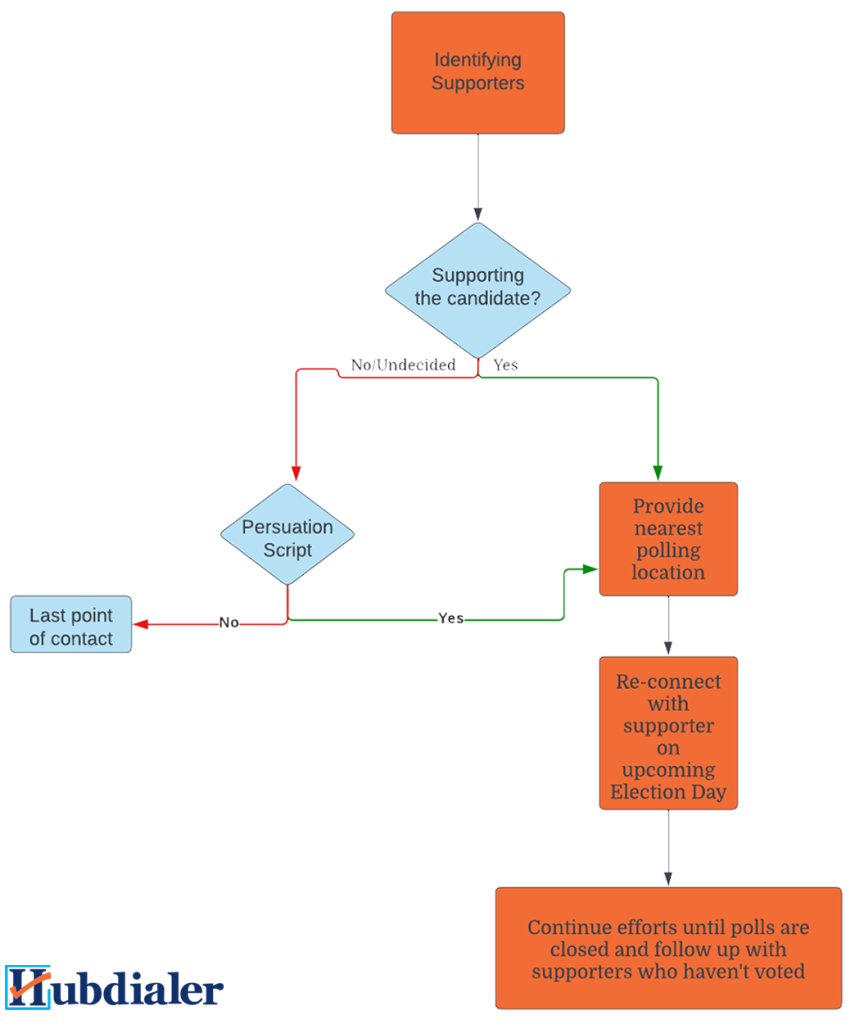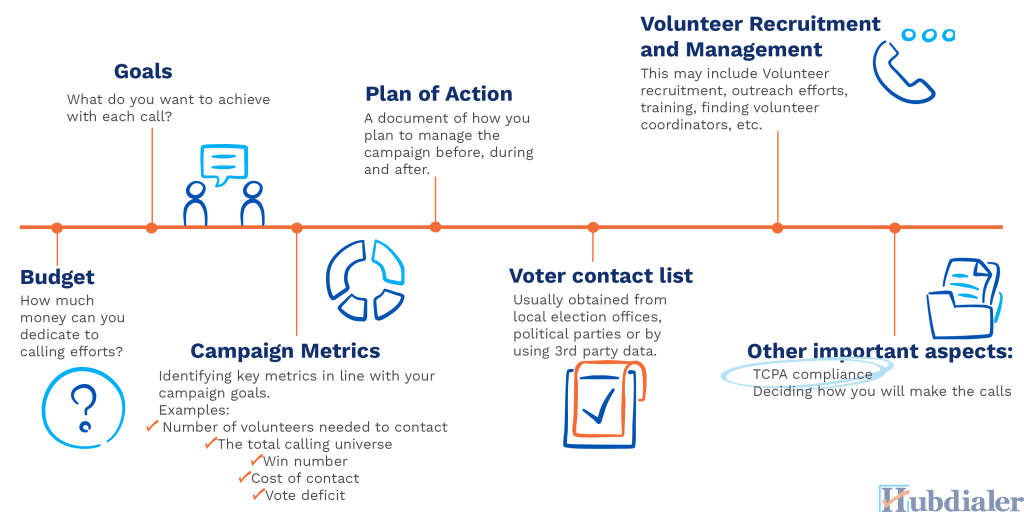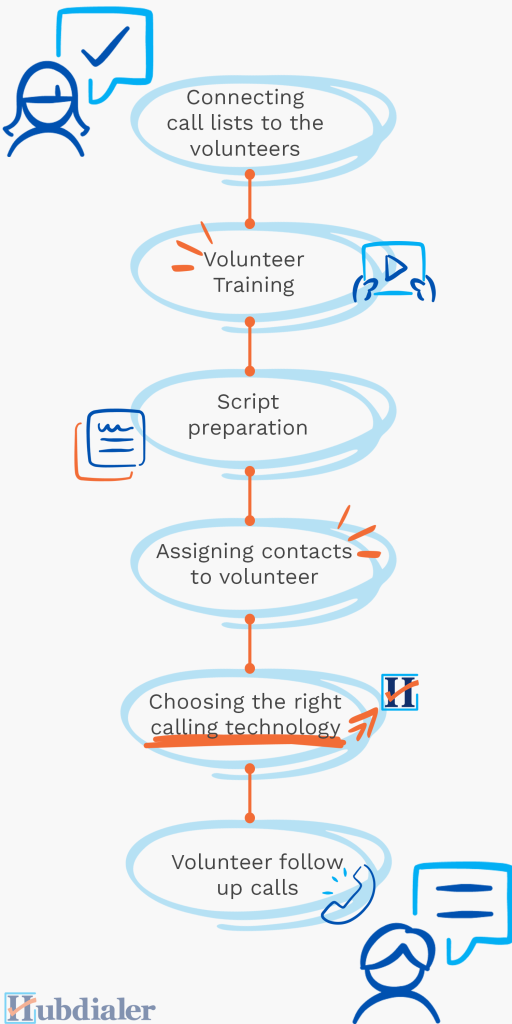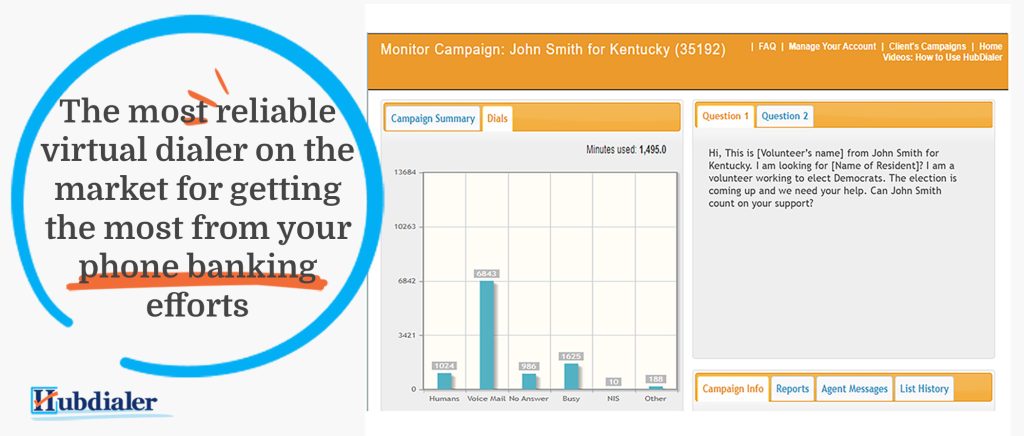Guides

Texting is now live! Learn more
Guides


The success of any political campaign depends on many factors. Planning phone banking campaigns and executing them with the help of volunteers, phone banking scripts, and other field tactics are among the most effective tactics you can use for political races.
Well-organized and carefully planned phone banking campaigns can majorly impact any political activity, which is why political organizations need to get them right. Volunteers can call from hundreds to thousands of voters and achieve remarkable impact.
For example, around 1.7 million calls were made on the first Vote Save America Weekend of Action in 2020, which was nothing less than amazing.
If you are new to phone banking or just starting, we will break down the most important concepts in this complete guide and help you understand the main ideas of this powerful political tactic.
Phone banking refers to contacting potential voters via telephone to persuade them to vote for a particular candidate or cause. Phone banking is a type of voter outreach that usually involves volunteers who make phone calls to identify supporters, raise funds, get people to attend events, and encourage them to vote.
Political campaign volunteers who participate in phone banking efforts often make a real difference by reaching out to hundreds of potential voters each day. Thanks to volunteers, political organizations can use phone banking for targeted political activities such as GOTV (Get Out The Vote) or recruit more volunteers by connecting directly with communities.
Phone banking can be an effective way to reach large numbers of voters in a short time. Volunteer calls can be used in conjunction with other methods of voter outreach, such as political canvassing or distributing campaign materials.

Effective phone banking targets specific groups of voters, such as those who live in swing states or who have voted in previous elections.
Phone banking relies on volunteers and calling agents to perform calls effectively and at scale.
Volunteers are typically given a list of people to call. They dial each number manually and then talk to the person who answers the phone. In the past, this process was done manually by volunteers who would have to dial each number individually and then talk to the person who answered the phone. They would also have to record information about the call on paper, which would then need to be entered into a CRM by the campaign manager.
This process was both tedious and time-consuming and often resulted in errors. With the advent of new technology, phone banking has become much more efficient. Now, automated systems can call hundreds or even thousands of people at once, record information about each call automatically, and easily keep track of data.
Simply put, there are two ways to do phone banking:
For volunteers with little experience, manual phone banking allows them to control the calling tempo, but they don’t maximize the volunteers’ time. Once volunteers get more confident and comfortable, they usually switch to autodialers that help them reach out and persuade more people.
Autodialers are much more efficient than having volunteers manually dial each number and save a lot of time. Volunteers don’t have to worry about incorrectly recording information or forgetting to enter it into the CRM (Custom Relationship Management software). Other options include voiceover IP (VoIP) technology, which uses the internet to make calls instead of traditional phone lines, so again, volunteers do not need to manually dial each number.

Another aspect of phone banking is the location of the volunteers when making the calls. Traditionally, volunteers would gather at the campaign headquarters and create a collective call center using physical phones and manual data entry.
However, there are more and more examples when volunteers meet at someone’s house or call people directly from their homes using the data provided. And web-based auto-dialers enable phone banking from anywhere. Volunteers log in and start calling – all they need is an internet connection.
The main goal of any phone banking campaign is to establish conversations with people, gather information, and collect data.
Phone banking also has a couple of big benefits for organizations:
Phone banking is still a fantastic tactic that every political campaign, nonprofit, and advocacy group/organization should use to establish meaningful connections with many people.
There are many scenarios and use cases for political phone banking:
Phone banking is essential when reaching out to voters and trying to learn more about them, their motivations, voting preferences, etc.
Phone canvassing is another form of political outreach that can include phone calls for collecting information, candidate or issue support, or mobilizing voters. People performing phone canvassing are either volunteers or paid staff working on campaigns.
Phone banking helps with GOTV efforts and voter mobilization by reminding the voter of their polling locations and voting hours and to answer voters’ questions. If early voting is available, phone bankers support people with additional information about how to vote. At the same time, the collected data during GOTV help update the voter databases.
Phone bankers can ask potential volunteers from their list if they are interested in participating in a campaign. Phone bankers can then share and collect information to support a campaign’s volunteer recruitment team.
A political call center is where volunteers or paid staff call voters. When using phone banking, political centers can be more efficient, make target calls, integrate phone scripts into the calls, collect data and motivate people.
Phone bankers use scripts to ask voters about their political affiliation, voting history, and support for specific candidates or programs. A good phone banking campaign can scale and leverage all these efforts.
Similar to voter identification, phone bankers use their prewritten scripts to persuade undecided voters to take some form of action – either to vote in general or to convince them to vote for someone or something specific.
Phone banking is very useful for identifying and targeting potential fundraising donors, providing information about the campaign, and asking for financial donations of all sizes. In addition, phone banking helps follow up with existing donors and ask for additional contributions when working on grassroots fundraising for campaigns.

Now that we know what phone banking is and why it is beneficial, we should also ask if it is effective and worth the effort.
Phone banking can be extremely effective, especially when calling people likely to vote for your candidate or support your cause. Here are some other reasons why it is effective:
Phone banking is personal, and this is what makes it effective. Although door-to-door canvassing is a more effective method for voter contact, phone banking reaches more people in less time. And throughout an entire campaign, the goal is to get as many voters as possible – phone banking is the best way to accomplish this while maintaining the personal touch of peer-to-peer conversations.
Phone banking is highly effective whether you work on GOTV, fundraising, voter activation, or recruiting volunteers.
The organization of phone banking activities can be quite complex. Here we summarize the most common elements every phone banking campaign should include.
Generally, there are three main phases of political phone banking:
Let’s dive in and go through each of these phases.
Unsurprisingly, good preparation and planning can make or break your campaign. Some basic elements that you have to think about include the following:
A big part of planning includes volunteer recruitment and management. This can include
Typical planning of volunteer activities includes answering questions like:
Other important aspects include the following:

It would be best to focus on these most common aspects when planning call campaigns. A checklist is always valuable to ensure you get everything vital before moving to the calling phase.
If you have prepared correctly, you can now start calling people. This phase also comes with a couple of big activities, such as:

Note: volunteers need to be motivated throughout the calling campaign. Calling voters repeatedly can be exhausting, so it helps to show volunteers how much you appreciate their efforts and the energy they invest. Supporting them during campaigns and showing gratitude makes phone banking even more successful.
It is almost impossible to do everything right during a call campaign. That is why it is important to monitor and improve things in real-time.
If you use one of the calling tools available on the market, campaign supervisors can listen to live calls and share their advice with the volunteers. Many modern tools enable users to share feedback and messages with the volunteers using their in-app messaging features.
If the voter conversion rates aren’t satisfying, campaign managers can listen to call recordings, identify potential issues (for example, if phone bank scripts are too long), and adjust accordingly.
Every phone banking campaign should use call analytics to analyze the performance. It is common to have detailed reporting with calling tools, but focusing on the right metrics might be challenging.
Typical call metrics that you want to monitor:
Looking at the campaign metrics can reveal if
Whatever the reasons for not reaching the campaign goals, you should get enough insights to improve the performance and drive greater impact.
Everything listed above shows that a successful phone bank campaign requires careful planning, execution, and management. It depends on many different factors and often requires flexibility and experimentation. It is very hard to hit a home run the first time. You should test other scripts, training types, or even dialers.
For example, Hubdialer is used by many political professionals during political events because of its simplicity, reliability, and ability to track and evaluate the results of any phone campaign.
Volunteers are a vital element of any campaign, big or small. There is simply no way to conduct activities at scale and reach out to many people without having volunteers involved.
There is no shortage of activities that volunteers can do, and in a typical political campaign, they can:
Volunteers can be a part of every phase of the political campaign. Historically, volunteers were mostly used to support fieldwork, but their knowledge and energy can do much more than that.
Finally, if a political campaign has many volunteers, the public sees the candidate is supported by “ordinary people,” which improves the general image of a campaign. Gone are the days when only consultants and TV ads would win a campaign. Simply put, volunteers can be the difference between winning and losing.
So far, we have focused mostly on how phone banks typically work, how they are organized and described their most important elements.
We want to share some practical advice for volunteers and people directly contributing to phone bank success. Experienced callers can make up to 100 calls per hour, so campaign managers need to provide consistent support and feedback.
Some of the most common aspects of call include:
Let’s look at these scenarios and how volunteers typically handle different situations.
As a first-time volunteer, you might feel nervous before making calls. This is quite normal; after all, volunteers make many calls, which often means that some calls will be awkward and unpleasant.
Here are a couple of points you can follow before the calling phase begins:
If you stick to these basic rules, you’ll call and make an impact in no time!
A good advice to everyone involved in making calls is to think about calling as a way to establish a small relationship with someone. And if you bring a positive attitude to each conversation, the person on the other end will be more likely to act.
In practice, this could include things like:
In short – stay natural and relaxed while sticking to the script.
Persuasion is a critical element of any calling campaign. Conversations are all well and good, but you need people to take action.
But how can you ensure you bring the persuasion elements into your calls? We have some advice for that too:
Making persuasive calls is not easy, just like with other aspects of phone banking – the more you practice, the better you get at it.
It is normal that some callers are negative and difficult to talk to. Most likely, you will experience cases like:
These scenarios will inevitably happen from time to time. Don’t worry; the best advice is to say “thank you for your time” and politely finish the conversation. You want to focus on the people that are open to talking.
As a wrap-up of this section, let’s look at some DOS and DON’TS.
DO:
DON’T:
Being a successful caller can be challenging. But if you prepare properly, stay positive and deal with negativity correctly, you’ll master phone banking in no time.
When working on political phone banking as a volunteer, you will often be introduced to various tools that help with call preparation, call making, data collection, follow-up calls, etc. Different dialers are one of the most common tools that make the calling process more efficient and scalable.
Depending on the preferences of campaign managers, you might encounter predictive, preview, and power dialers, which are different types of auto-dialers.
Let’s quickly look at what these are and how they work.
An auto dialer is software typically used in a call center or by political campaigns to make multiple calls simultaneously, depending on the agent/call ratio chosen during setup. Auto dialers allow phone bankers to reach many voters quickly since they eliminate the need to dial each number manually.
The biggest benefit of auto-dialers is that they make phone banking more efficient, requiring fewer volunteer hours spent on calls. Auto dialers have many advanced, useful features like automatic calling back to numbers that were unanswered or that reached a voicemail, script programming, leaving pre-recorded messages, and data analytics.
A predictive dialer is a phone system that helps improve call efficiency by automatically making calls and predicting when a call agent will be available for the next call. Predictive dialers use an algorithm that analyzes statistics (answered calls, dropped calls, number of active agents, talk times, etc.) and determines the best time to make the next call based on current call volume, often called a dialing ratio.
Predictive dialers are very popular because agents that call voters can make up to 100 calls per hour while having up to 50 live calls. While predictive dialers work the best when you have 10 or more agents working on a call campaign simultaneously, they are practically irreplaceable when many people need to be reached in a short time frame, such as during the GOTV campaigns.
And as mentioned before – less waiting time and more connected calls mean more efficiency, higher voter outreach, and more voter mobilization.

A power dialer is another popular outbound type used for political phone banking. In contrast to predictive and auto dialers, power dialers dial the next phone number from the list right after an agent completes his current call. The agents can manually move to the next calling number if a call is unanswered or busy.
Power dialers don’t require having multiple agents at a time – one person is enough to work with a power dialer. However, the number of calls per hour is limited, and most often, up to 20 calls per hour can be made.
Power dialers are used when call quality is more important than quantity. For instance, if you want to make the most of every call, e.g., ask for donations, collect data and persuade people to perform some action, power dialers can nicely complement predictive dialers.
There is no doubt that phone banking is a powerful tactic that significantly impacts the outcome of political campaigns. If you carefully prepare, execute and monitor its progress, there is almost no limit to what you can achieve.
We can’t emphasize enough how important it is to recruit, motivate and appreciate volunteers and their work in phone banking. Use this guide’s best practices and practical advice to establish healthy and meaningful relationships with your volunteers throughout your campaigns.
And once you start planning your call campaigns, sign up for Hubdialer and use the power of predictive dialing to get the most out of your phone bank. We work with hundreds of campaign managers and political consultants annually and understand that each call counts, just as each vote counts!